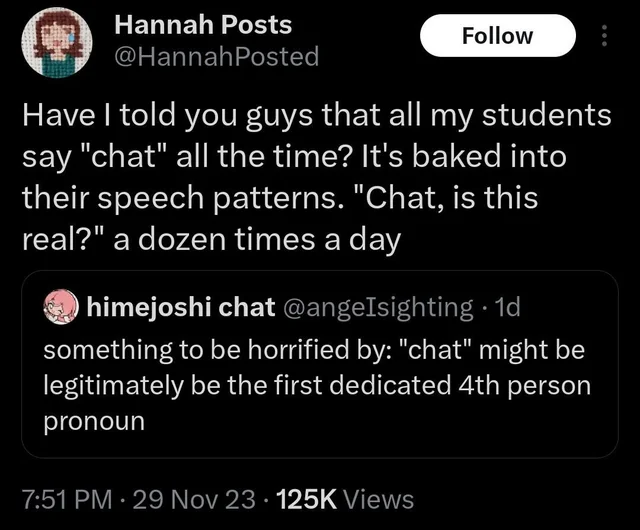this post was submitted on 21 Dec 2023
767 points (95.7% liked)
People Twitter
5283 readers
508 users here now
People tweeting stuff. We allow tweets from anyone.
RULES:
- Mark NSFW content.
- No doxxing people.
- Must be a tweet or similar
- No bullying or international politcs
- Be excellent to each other.
founded 1 year ago
MODERATORS
you are viewing a single comment's thread
view the rest of the comments
view the rest of the comments

You're right, just someone who is really into linguistics as a hobby. So I'm not coming from an academic background (e.g. study of how languages change), but rather a practical side (how languages work). I love studying grammar, especially from very different language families. So for me, grammar is incredibly important because it's how we keep communication consistent across diverse populations, and changing it regionally gets in the way of that.
But language is constantly changing, there literally is no "proper" version of any language, because any "proper" version is going to be biased toward the dialect spoken by whichever group created the "proper" version of that language.
Published grammatic standards, e.g. the MLA handbook, are for specific use cases and do not define the language itself
The "proper" version of a language is the one that's most common in current use, and that can absolutely be codified and taught. Consistent teaching of a set of rules keeps the language consistent and intelligible across regions.
And yes, there is no "owner" of English, but there are very influential bodies that establish the rules that are taught in schools. So in a sense, they do define the language because that's what's being taught in schools, and that's what keeps the language consistent.
Your perspective begs the question, if Standard American English is the "proper" language," how did it become the "proper" language when it didn't even exist 200 years ago? The answer is that language is constantly evolving, and by definition there is no "proper" form of any language. The way Americans speak today is different from 50 years ago, which was different from 100 years ago. The idea of a "proper" form of a language existing is usually imposed by a group seeking to subvert or exert control over other groups, outside of the specific use cases I mentioned before, like professional or academic language. Read this
Here's how I see it:
The English used today is very similar grammatically to the language used 200 years ago, so despite the Wild West days of the US, I think education has done a pretty good job of keeping the language stable. We obviously get new phrases and idioms as culture evolves, but grammar has remained pretty consistent
Here are the historical major events
Then look at English from the 1700s to today, over ~300 years, we've had very few changes in grammar. I guess thee and thou finally fell out of favor, but there's really not many changes, and that's about as long as the period between any of those major events.
"As codified" by who?
Grammar text books.
And who wrote those?
Professors.
And who/what gives them the authority to decide which is the "proper" dialect of a language?